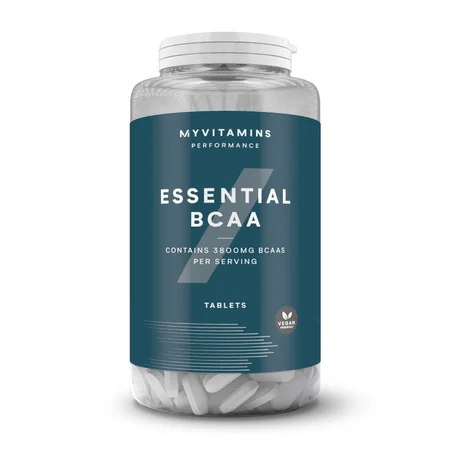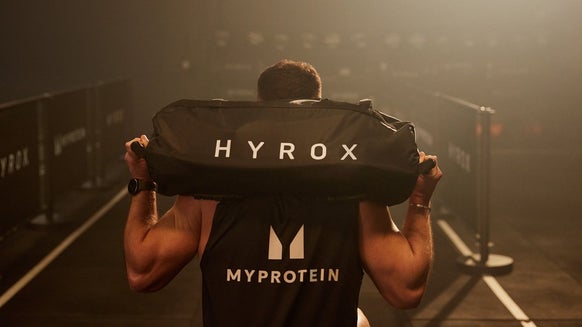What Are BCAAs & Their Benefits?


Branched chain amino acids (BCAAs) have been a popular supplement since the 1980s, but are they still suitable for people looking to build muscle mass? In this article we’ll bring you up to speed with current scientific thinking and outline the scenarios where BCAAs can have a significant impact. We’ll explain what BCAAs are and how they work, as well as their benefits. We’ll also explain when to take BCAAs, discuss dosages, potential side effects, and list some foods high in BCAAs.
In this article, you'll find:
- What are BCAAs?
- How do BCAAs work?
- Benefits of BCAAs
- How can BCAAs be helpful?
- When to take BCAAs
- Dosage and side effects for BCAAs
- BCAA food sources
- FAQs
What are BCAAs?
BCAAs (branched chain amino acids) are three essential amino acids that have a chain that branches off to the side, giving them their name. Muscle protein is made up of 20 amino acids — 9 essential and 11 non-essential. Essential amino acids can’t be synthesised by the body and need to be included in your diet. The three essential amino acids known as branched-chain amino acids (BCAA) are leucine, isoleucine and valine.
Amino acids are used to build muscle protein and BCAAs are often supplemented to boost muscle growth and improve performance. Leucine is a particularly essential BCAA as it acts as a signal that ‘switches on’ muscle protein synthesis (MPS — the process of building muscle).1 BCAAs are found in a variety of high-protein foods. They are also available as a supplement in powder or capsule form and popular with body builders as BCAAs are shown to improve muscle recovery and performance.1

Can You Mix Creatine and BCAA?
Spoiler alert: yes. And here's why it's a good idea.
How do BCAAs work?
Eating a high-protein meal and BCAAs will increase your body’s rate of muscle protein synthesis.2 This is important as you need to be in a positive protein balance to gain muscle. In your body, there’s a continuous muscle protein turnover, with periods of increased muscle protein synthesis (MPS) and periods of muscle protein breakdown (MPB).3

47 Meal Prep Recipes For Muscle Building & Fat Loss
Your next favourite prep is in here...
If your total muscle protein synthesis exceeds muscle protein breakdown, you will be in a positive protein balance and will gain muscle mass. On the flip side, if MPB exceeds MPS, the overall result will be a loss of muscle.
Using a BCAA supplement can help increase your body’s muscle protein synthesis rate.4 This will result in a positive protein balance and increase the likelihood of muscle gain.5
BCAA Benefits
BCAAs support muscle hypertrophy AKA increased muscle growth
Due to the role BCAAs play in increasing MPS rates, BCAA supplements have typically been used with the intention of maximising muscle growth. Despite this, the evidence doesn’t support the theory that BCAAs alone can increase muscle growth.2
The current view is that BCAAs act as a signal and the building blocks of muscle protein synthesis. However, all the essential amino acids need to be present to sustain MPS rates in a way that will build muscle.2
So, consuming a good whey protein supplement with all the essential amino acids and rich in BCAAs is a much better strategy when looking to optimise muscle gain.

Push Pull Legs Routine | The Best Mass-Building Workout Split
Try this very simple training method.
BCAAs help muscle soreness and recovery
Numerous studies have shown that BCAA supplementation has helped to reduce the feeling of muscle soreness following intensive weight training.6,7 Great news to anyone who’s struggled to get up after a heavy leg day.
However, for improving recovery in a way that will affect muscle performance, the effects of BCAAs seem minimal.6,7 For example, a recent study showed no impact on the performance of vertical jump and jump squat tests despite BCAA supplementation.7
Hitting the right daily calorie and protein totals seems to be the key factor to optimising recovery.8

Macro Calculator | How To Calculate Your Macros For Flexible Dieting & IIFYM
Use our calculator to work out your macros.
How can BCAA Supplements Be Helpful?
Although there is a lack of evidence to support the use of BCAAs for muscle growth and recovery, BCAA supplementation will provide a benefit to people in certain circumstances.
BCAAs can supplement low protein meals
One of the most significant benefits of supplementing with BCAA powder is how it will ‘rescue’ a meal that’s low in protein.
Research has shown that adding 5g of leucine to a beverage containing 6.25g whey protein had the same effect on muscle protein synthesis as a beverage containing 25g whey protein.4
This can be really helpful if you’re caught in a situation where your food intake is somewhat out of your control. For example, if you’re faced with a hectic day of meetings at work and the only option is the dreaded shop-bought sandwich.
Having a backup source of BCAAs on hand can help ensure your low-protein meal will still raise muscle protein synthesis rates.

Protein Sources Low in BCAAs
Not all protein sources contain the same amount of BCAAs. Plant-based protein sources such as wheat, hemp and soy have lower BCAA content than protein sources like dairy, eggs, meat, and fish.9
This is particularly relevant for vegetarians, vegans or anyone struggling to include BCAA-rich protein sources in their diet.
While it’s possible to improve your meal’s amino acid profile by mixing up your protein sources, BCAA supplementation can provide a straightforward solution. It can also ensure your vegetarian or vegan meal has the most significant impact on muscle protein synthesis rates.
BCAAs can help curb appetite
One of the benefits of a high-protein diet is the satiety response (feeling of fullness) that protein provides. If you’re struggling to eat enough protein for your health and fitness goals, then supplementing with BCAAs can help ensure that you’re maximising MPS rates.
Research has also shown that altitude-induced hypoxia will suppress appetite.10 For anyone training at altitude, BCAAs can help fight the effects of a reduced appetite by enhancing the impact of protein in your meals.

When to take BCAAs
There’s evidence to suggest that there’s a saturation point and that MPS rates will return to baseline regardless of the number of amino acids consumed in one serving.11 So, a good tacticis to consume BCAAs at regular intervals throughout the day, alongside meals that are low in protein and BCAAs.
Before and during a workout: BCAAs can be taken before a workout to spark muscle building while you’re still working out, and to prevent muscle fatigue. One study has shown that muscle fatigue was reduced by 15% by supplementing with BCAAs during a workout.12
After a workout: You can also take BCAAs after a workout to improve your recovery post-workout, with studies reporting reduced muscle soreness and better performance in training sessions in the days following supplementation.13,14

BCAA for Women | What are BCAAs & Should You Take Them?
Could this get you through that gruelling gym sesh?
BCAA Dosage
When taken at mealtimes, the dose of BCAAs will depend on the amount of BCAAs in the meal. However, as a general guide, 3-5g of BCAA is sufficient to initiate MPS rates.3 To maximise synthesis rates to build muscle, BCAAs should be combined with all the other essential amino acids.
Side Effects
Taking BCAAs is generally safe and most people won’t experience any side effects.
There are a few conditions where it may not be advisable for you to take BCAAs, so if you have any concerns, then please speak with your doctor before taking.
As no studies have involved pregnant women, it’s not recommended that you take BCAAs if you are pregnant or breastfeeding.
BCAA Food Sources
Although you may choose to take a BCAA supplement, it is also helpful to know which foods are high in BCAAs:
- Meat
- Dairy
- Poultry
- Fish
- Nuts
- Seeds
- Soy beans, soy milk, tofu
- Legumes like beans and lentils
FAQs:
What are BCAAs?
BCAAs are the three essential branched chain amino acids, leucine, isoleucine and valine.
What are the benefits of BCAAs?
The benefits of taking BCAAs include increased muscle growth, muscle recovery, and benefitting meals low in protein.
When should I take BCAAs?
Evidence suggests that the optimal times to take BCAAs are around a workout, so before, during and immediately after your training session.
What dosage of BCAAs should I take?
You should aim to take 3-5g dosages of BCAAs to yield optimal benefits.
What are the side effects of BCAAs?
Taking BCAAs is generally considered safe, however due to a lack of research, it is not recommended to take BCAAs during pregnancy.
Take home message
Although the evidence shows that supplementing BCAAs without the other essential amino acids isn’t enough to enhance muscle mass alone, as with most things in the field of sports nutrition, context and relevancy are key.
The current view is that adding BCAAs to a meal with low-protein content will help to maximise your body’s muscle protein synthesis rates.
It could also be of benefit to those who struggle to eat enough protein due to the satiating effect of a high-protein diet or altitude-induced hypoxia.

What Is L-Carnitine? | L-Carnitine Benefits, Dosage & When To take?
Should you consider adding this supplement to your routine?

What is L-Theanine? | L-Theanine Benefits, Dosage and Side Effects
Weight loss, immune support & relaxation...

Liam is a certified sport nutritionist with the International Society of Sport Nutrition and is enrolled on the British Dietetics Association’s Sport and Exercise Nutrition register. He has a Bachelor’s of Science in Sport and Exercise Science and is graduate of the ISSN Diploma in Applied Sport and Exercise Nutrition.
Liam is an experienced personal trainer, helping clients reach their health and fitness goals with practical, evidence informed exercise and nutrition advice. In his spare time Liam has competed in numerous powerlifting competitions and enjoys hill walking, football and expanding his recipe repertoire in the kitchen.Find out more about Liam's experience here.







